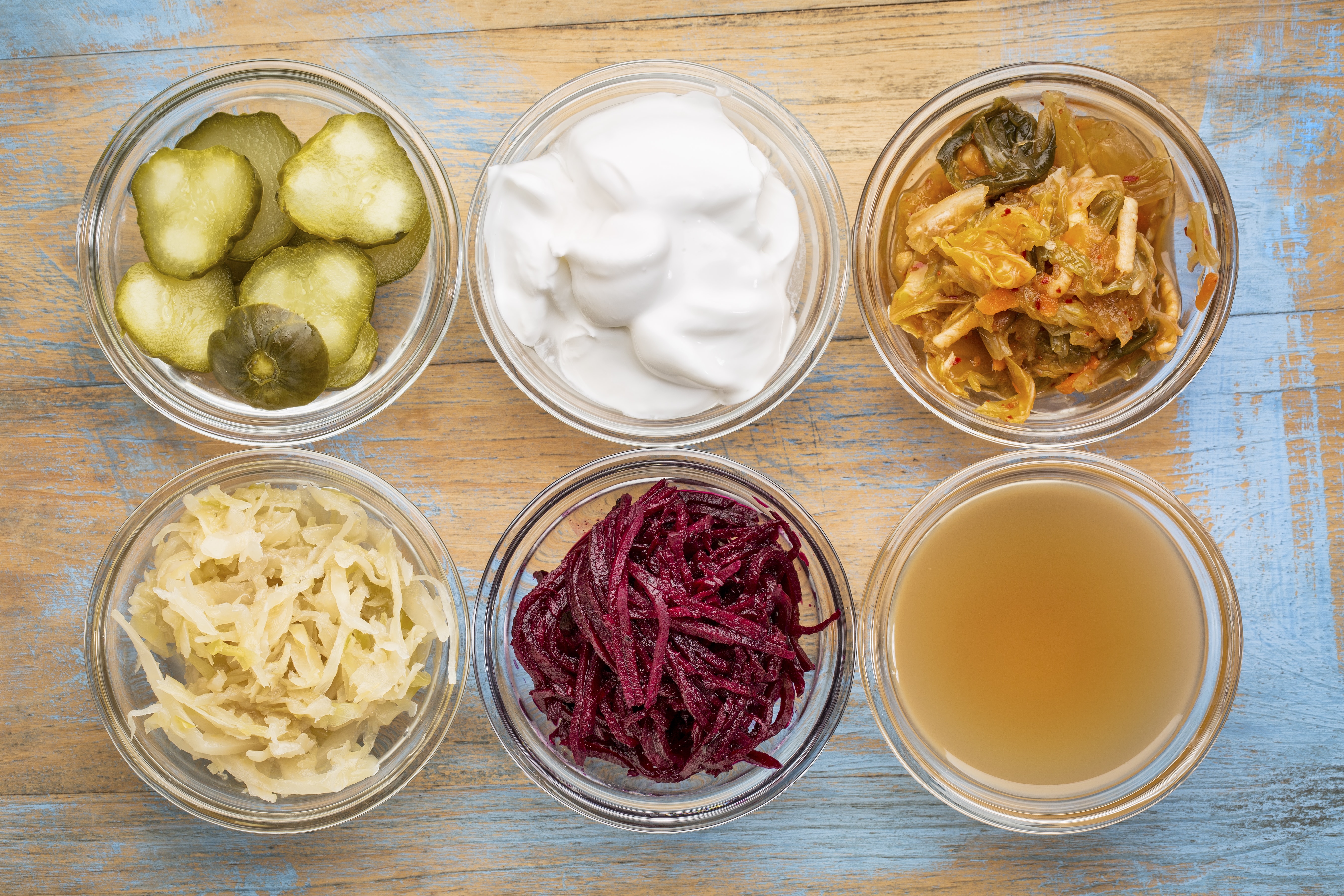The trillions of microflora (natural bacteria) in the gut play an essential role in supporting and maintaining strong immune and digestive systems, so having the optimum balance of these beneficial bacteria is vital.
At birth, the infant's gut flora is influenced by that of the mother and the environment around them.
Factors that can affect balance in your gut:
Throughout life, a number of factors can affect this balance, including:
- Antibiotic use
- Infection
- Stress
- Travel
- Period of unhealthy nutrition or lifestyle
Gut microflora imbalance
An imbalance of the gut microflora can be associated with a range of conditions:
- Irritable or inflammatory bowel
- Infections
- Traveller’s stomach
- Antibiotic Associated Diarrhoea
- Leaky gut
- Lactose intolerance
- Atopic dermatitis
The bacteria in a probiotic works as a protective barrier in your gut, by lining your digestive tract and helping your body to absorb much needed nutrients, while also fighting off infections.
Numerous studies in the past two decades have demonstrated links between gut health and the immune system, mood, mental health, autoimmune diseases, endocrine disorders, skin conditions and cancer.
Low good bacteria levels
When the ratio of ‘good’ bacteria is lowered, health concerns may arise, including:
- Excessive gas
- Bloating
- Poor immunity
- Low energy
- Constipation
- Diarrhoea
- Candida / Thrush
- Decreased nutrient absorption
Unhealthy gut
Many aspects of modern life such as chronic stress, sleep deprivation, consuming processed and high-sugar foods and frequently taking antibiotics can all damage our gut. This in turn can affect other aspects of our health, such as the brain, heart, immune system, skin, weight, hormone levels, ability to absorb nutrients and even the development of cancer.
There are a number of ways an unhealthy gut might manifest.
1. Upset stomach
Stomach disturbances like gas, bloating, constipation, diarrhoea and heartburn can all be signs of an unhealthy gut.
2. Sugar cravings
A diet high in processed foods and added sugars can lower the amount of good bacteria in your gut. This imbalance can trigger sugar cravings, and when these are acted on, it can damage your gut further.
Large amounts of refined sugars in a person's diet have been linked to increased inflammation in the body. Inflammation is the precursor to a number of diseases and cancers.
3. Unintentional weight changes
Gaining or losing weight without making intentional changes to your diet or exercise habits may be a sign on an unhealthy gut. An unhealthy gut can hinder your body's ability to absorb nutrients, regulate blood sugar and store fat.
Weight loss may be caused by small intestinal bacterial overgrowth (SIBO), while weight gain may be caused by insulin resistance or the urge to overeat due to decreased nutrient absorption.
4. Sleep disturbances or constant fatigue
An unhealthy gut may contribute to sleep disturbances such as insomnia or poor sleep and therefore lead to chronic fatigue, The majority of the body's serotonin (a hormone that affects mood and sleep) - is produced in the gut, so gut damage can impair your ability to sleep and your mood.
5. Skin irritation
Skin conditions like eczema may be related to a damaged gut. Inflammation in the gut caused by a poor diet or food allergies can cause an increase in the release of certain proteins into the body, which in turn can affect and irritate the skin.
6. Autoimmune conditions
An unhealthy gut may increase systemic inflammation and alter the regular functioning of the immune system. In some cases, this can lead to autoimmune diseases, where the body attacks itself instead of harmful invaders that may enter.
7. Food intolerances
Food intolerances are the result of difficulty digesting particular foods (this is different than a food allergy, which is caused by your immune system reacting to certain goods). It is thought that food intolerances may be caused by poor quality bacteria in the gut, leading to difficulty digesting food as well as symptoms such as bloating, gas, diarrhoea, abdominal pain and nausea.
Improving your gut health
What to do:
1. Lower your stress levels high levels of stress take a toll on your whole body, including your gut.
A variety of stressors can negatively affect gut health, including psychological stress, environmental stress (extreme heat, cold, or noise), sleep deprivation or disruption of the circadian rhythm.
Try to lower your stress levels by practicing meditation, walking, getting a massage, spending time with friends/family, diffusing essential oils, decreasing caffeine intake, yoga and exercise.
2. Get enough sleep - Not getting enough/sufficient quality sleep can have serious impacts on your gut health, which can in turn contribute to more sleep issues. Try to prioritize getting at least 7–8 hours of uninterrupted sleep per night.
3. Eat slowly - Chewing your food thoroughly and eating your meals more slowly can help promote full digestion and absorption of nutrients, as well as reducing digestive discomfort and maintaining a healthy gut.
4. Take a prebiotic or probiotic - Adding a prebiotic or probiotic supplement to your diet can be a great way to improve your gut health. Prebiotics promote the growth of beneficial bacteria in the gut, while probiotics are live good bacteria.
5. Check for food intolerances - If you have symptoms such as cramping, bloating, abdominal pain, diarrhoea, rashes, nausea, fatigue and acid reflux, you may be suffering from a food intolerance. You can try eliminating common trigger foods to see if your symptoms and digestive health improve.
6. Avoid taking antibiotics unnecessarily. Although it is often necessary to take antibiotics to combat bacterial infections, antibiotics are also damaging to the gut and immunity. Some research reports that even 6 months after antibiotic use, the gut still lacks several species of beneficial bacteria.
7. Avoid smoking. Smoking affects gut health as well as the health of the heart and lungs. A 2018 review of research published over a 16-year period found that smoking alters the intestinal flora by increasing potentially harmful microorganisms and decreasing the levels of beneficial ones.
What to eat & drink
1. High-fibre foods such as legumes, beans, peas, oats, brown rice, wholemeal bread, bananas, berries, asparagus and leeks have shown a positive impact on gut health in numerous studies.
A diet rich in fibre can help digestion and prevent constipation. Aim for the recommended dietary intake of 30g of fibre a day.
2. Fermented foods such as kimchi, sauerkraut, yogurt, tempeh, miso and kefir are great sources of probiotics.
3. Beware of gut symptom triggers. One way to work out which foods cause your symptoms is to keep a food diary. Acidic foods such as tomatoes, citrus fruits, salad dressings and fizzy drinks can trigger heartburn, while wheat and onions may cause irritable bowel syndrome.
If you cannot digest lactose (the sugar in milk) you can develop wind and diarrhoea after drinking milk or eating dairy products.
4. Choose the right drinks to ease digestion. To make digestive problems less likely, choose drinks that aren't fizzy and don't contain caffeine, such as herbal teas, milk and plain water.
5. Try tummy-friendly yoghurt. You can take probiotics as supplements or in live yoghurt, which is a good natural source.
6. Stay hydrated - Drinking plenty of water has been shown to have a beneficial effect on the mucosal lining of the intestines, as well as on the balance of good bacteria in the gut. Fibre acts like a sponge, absorbing water. Without fluid, the fibre you consume can't do its job and you will become constipated.
Skin & gut health
Experts have frequently said your gut health and your skin are in sync with one another. This makes sense as skin conditions such as psoriasis and eczema are linked to your gut health and poor digestion can also lead to acne.
Looking after your gut health can help you develop and maintain a healthy glow all year round.
Stress & anxiety
With trillions of both good and bad bacteria and yeast living in our gut, maintaining a natural balance is important to our overall well-being.
Research carried out at APC Microbiome Ireland in UCC has found that when there is a disruption in the balance of the bacteria in our gut, this bacteria can influence molecules in the part of the brain that deals with anxiety and fear-related behaviour, causing us to feel anxious or stressed.
This research found that anxiety and stress can be triggered by a changing balance of bacteria in the gut and balancing this bacteria can help to minimise stress and anxiety.
Research has also shown that – vice versa - experiencing stress or anxiety can lead to problems in your gut, again highlighting the link between gut health and the mental wellbeing. People suffering from Irritable Bowel Syndrome (IBS) have also been known to suffer from anxiety and depression as a result of the condition.
By maintaining a healthy gut, we can keep the prefrontal cortex and amygdala working properly and this in turn will help to reduce anxiety and stress.
Probiotics can restore a natural balance in bacteria and help to maintain that healthy gut. Because of these links between gut and brain health, probiotics could be beneficial for those experiencing anxiety and stress.
Recommended probiotics*
There are several different variations of probiotics which have specific functions.
For: a busy or stressful time
- Zenflore is a brand-new probiotic which provides complete support for your mind and body by helping to support a healthy mind and combat stress-related fatigue
For: improved Digestion
- Udo’s Choice Super 8 contains eight strains of healthy bacteria which help to aid proper digestion, aid the build-up of beneficial bacteria after taking antibiotics and support general health
For: inflammation
- Alflorex has anti-inflammation effects and has been found to help reduce the symptoms of IBS, bloating, bowel movement difficulty and abdominal pain and discomfort
For: Urinary Tract Infections (UTIs)
- Bio-Kult Pro-cyan is specifically designed to target UTIs. It has a triple action formula scientifically developed with cranberry extract, two specifically selected live bacteria strains and Vitamin A, which contributes to the normal function of the immune system and maintenance of the mucous membranes found along the urinary tract
For: Children
- Bio-Kult Advanced Multi Strain and Bio-Kult Infantis are specifically formulated to be child-friendly. The Advanced formula contains 14 live bacteria cultures, which can deliver higher concentrations of beneficial bacteria to the gut and therefore be able to help a more diverse range of digestive disorders. While the Infantis has 7 live bacteria cultures, it also contains Omega-3, Vitamin D3 and Preplex
For: post-antibiotics
- Sona’s Afterbiotics can help your gut to recover from the after-effects of antibiotics. When we take antibiotics, they can sometimes lead to infection because they destroy both good and bad bacteria in the gut, and often the bad bacteria return before the good. Sona AfterBiotic is a supplement designed to restore the natural intestinal flora after a course of antibiotics, thus giving the good bacteria a chance to grow faster, preventing the bad bacteria from taking hold again
*Food supplements should not be used as a substitute for a varied diet. Pop into your local CarePlus Pharmacy and ask our friendly Pharmacists for advice on which probiotics are best for you.
Maintaining a healthy gut contributes to better overall health and immune function. By making appropriate lifestyle and dietary changes, people can alter the diversity and number of microbes in their gut for the better.
However, you should talk to their doctor before making any drastic changes to your diet. This is because for some people, such as those with irritable bowel syndrome or other medical conditions, probiotics and fibre-rich or vegetarian diets may not be helpful.

Information derived from HSE, NHS, Healthline and SpunOut

